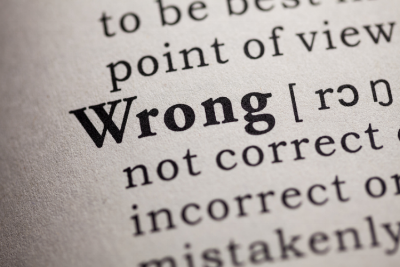Being less wrong.
We humans have this thing….this thing where we always want to be right. And the problem is, that it’s really really hard to be right. Luckily, I have come to realise that it’s the totally wrong way to approach life. Instead of thinking about how we can be right, we need to think about how we can be less wrong.
I recently came across a letter from Paul Grobstein, who was a Professor of Biology at Bryn Mawr College, in which he explains how there is no such thing as “right” and that the very concept needs to be replaced with “progressively less wrong”.
“The difference is far from semantic. “Right” is measured by proximity to some fixed idea, “progressively less wrong” by how far people have gotten from where they started. It is the aspiration to be “right” that leads to rigid hierarchical social organizations of all kinds, including educational systems. Wanting to be “progressively less wrong” takes one (and societies) in quite different directions entirely: it encourages life-long inquiry by every individual, a respect for past wisdom and enthusiasm for contributing to future understanding, and an appreciation of the enormous value of interactions between unique individuals each of whom has unique perspectives to contribute.”
To me, it’s about having a sense of humility, which in itself is a recognition of the huge uncertainty of the world we live in and our total lack of ability to predict the future. However, we humans have a great many quirks and one of them is how difficult it is for us to be humble. We tend to walk around with the idea (whether we admit it or are even aware of it) that everyone is wrong, except for us. We find it easy to convince ourselves that we know something that is unknowable.
It’s fascinating to think through why this is. Coming up with a belief or idea of the world takes time and energy for our brain. And once we have built up a belief we tend to actively seek out information that confirms our belief, and we discredit information that doesn’t agree with us. It’s called ‘confirmation bias’, and it’s just one of the many cognitive biases that we fall prey to.
There was a famous experiment published in Nature magazine in which participants were presented with evidence counter to their political beliefs. The researchers studied the participants brains and showed that the areas of their brain associated with physical pain became more active. It seems as if being wrong actually physically hurts us. Our brains (which are wired for survival) protect us by responding as if there was a real physical threat to us.
So, the concept of ‘being less wrong’ is clearly one that does not come naturally to us.
But why is it important?
Well, it’s incredibly important in the field of investing and financial planning. Some of the greatest investors of all have embodied the ‘less wrong’ mindset. Charlie Munger and Warren Buffett are two that immediately spring to mind.
“It is remarkable how much long-term advantage people like us have gotten by trying to be consistently not stupid, instead of trying to be very intelligent.”
“You only have to do a very few things right in your life so long as you don’t do too many things wrong.”
Charlie Munger is famous for his critical-thinking and decision-making. One concept that he uses is from the 19th Century German mathematician, Carl Jacobi – “invert, always invert”. When tackling a difficult problem, he flips it – he tackles it backwards instead of forwards. An example of this would be to look at each investment we have and instead of thinking ‘I am probably right about this’, we ask ourselves ‘why might I be wrong about this?’. (This doesn’t just apply to investing, you can apply this in many areas of your life.)
This approach is a wonderful way to foster critical thinking and curiosity, which are two essential traits for any good investor.
Likewise, in financial planning, we need to think about being less wrong instead of being right. Brian Portnoy talks about this in his book ‘The Geometry of Wealth’ as ‘winning by not losing’. This is such a critical concept in our money lives.
We have absolutely no idea what is in our future, what we will want, where we will be, who we will be. Ten years ago, could you have known where you would be today? Ten years ago, were there things that you thought were right, that turned out not to be right after all?
Does that mean we don’t plan? Of course not. We plan but within our planning we recognize that we have made a huge number of guesses about the future – about our future, and about variables that are totally out of our control (things like the return of different asset classes and inflation). And that is where the real power begins. Because once we have a plan we have something to revisit and improve. Oh guess what, we have got promoted, or fired, or had another child, or received an inheritance, or decided to move countries.
Without any planning and without continually revisiting our guesses and changing them, we don’t even have anything to try and be right about. But if we approach this whole process with the mindset of progressively getting less wrong over time, then we give ourselves a fighting chance of getting to a place where we want to be.
georgie@libertywealth.ky


